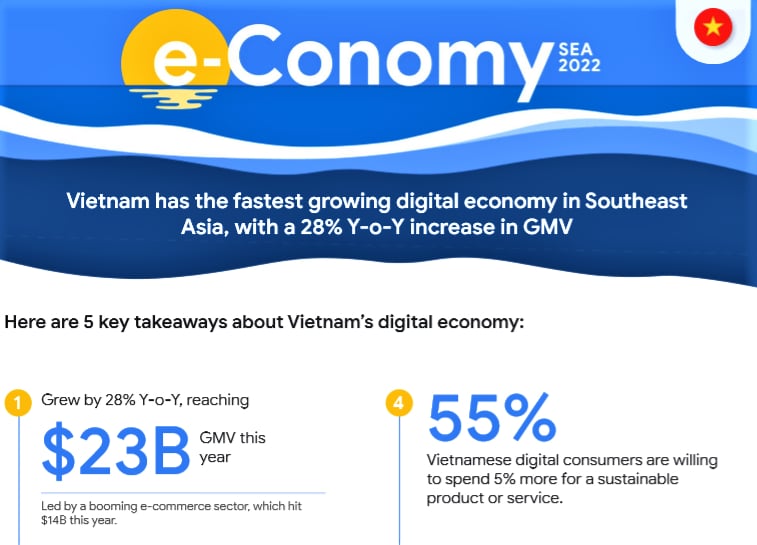Vietnam fastest growing digital economy in Southeast Asia
Vietnam is the fastest expanding digital economy in Southeast Asia, crossing Indonesia, Malaysia, the Philippines, Singapore, and Thailand, says a report by Google, Temasek and Bain & Company.

The e-Conomy SEA 2022 report by Google, Temasek and Bain & Company, October 27, 2022.
The Vietnamese digital economy’s gross merchandise value (GMV) is projected to grow 28% year-on-year to $23 billion this year, up from $18 billion in 2021, bolstered by a 26% year-on-year growth in e-commerce, the report released Thursday notes.
“Vietnam tops the chart as the fastest growing digital economy and the fastest growing e-commerce sector in Southeast Asia,” said Stephanie Davis, vice president of Google Southeast Asia.
Despite the current economic headwinds, the country’s GMV is on course to reach approximately $50 billion in 2025, according to the analysis.
“Fundamentals for Vietnam’s digital future remain solid, thanks to its high quality homegrown tech workforce and growing adoption of digital services across both urban and suburban areas. The growing awareness around environmental, social and governance considerations will help Vietnam and Southeast Asia build a sustainable growth plan for the digital decade,” Davis added.

High-rise buildings in Hanoi. Photo courtesy of the government's portal.
According to the report, post-pandemic Vietnam is among the countries that are on the fast track to resume its “back to normal” activities. However, some consumer habits and trends that were built and accelerated during the pandemic have remained and continued to grow.
E-commerce is the key driver for the growth of Vietnam's digital economy, and 90% of digital consumers intend to maintain or even further their usage of e-commerce platforms in the next 12 months. Majority of consumers who plan to maintain the same usage across food delivery (up to 60%) and groceries (54%).
Urban digital users are the heaviest adopters of digital services in Vietnam, with e-commerce, food and groceries having the highest adoption rates, up to 96%, 85%, and 85%, respectively.
On the contrary, Vietnamese consume online media content less frequently than what the regional average is, the study showed. Video, music and gaming consumption are all 10-12% below the average consumption. Just 23% of the surveyed people said they watched video on demand at least once a week, followed by 19% for gaming and on demand and 16% for music.
This also shows that Vietnam still has great potential for substantial growth in the long run, the study notes.
Digital financial services continue to flourish in Vietnam. “Digital lending grew the fastest at 114% combined annual growth rate, and investment is projected to take the biggest leap by 2025 with projected 106% CAGR (compounded annual growth rate).”
Moreover, Vietnam tops among the venture capital long-term growth markets, with 83% of VC firms expecting deal activities in the nation to grow in the long term. This ratio is the region’s highest.
“Vietnam’s digital economy will be a hot spot for growth because of its growing population and highly skilled local tech workforce,” said Fock Wai Hoong, deputy head, Technology & Consumer and Southeast Asia, Temasek.
Willy Chang, associate partner at Bain & Company, said: “Vietnam’s digital economy recovered strongly after a delayed impact from Covid in 2021. We expect continued strong growth momentum over the next decade given its high-quality homegrown tech talent pool, significant efforts by the government to accelerate digital transformation across sectors, and investor focus in the country.”
The “e-Conomy SEA 2022” report deep dives into trends and insights of the five mainstay digital sectors, namely e-commerce, online media, transport and food, online media and digital financial services. It covers the state and outlook of Southeast Asia’s technology funding landscape.
In an inaugural section on environmental, social, and governance (ESG) considerations, the report discusses the environmental and social impact of the digital economy and highlights the role of consumers, business, investors and governments in improving environmental and social sustainability.
The Google, Temasek and Bain & Company study says tech funding maintains strong momentum despite investors’ prudent disposition. With a 15% growth in deal value from H1/2021 to H1/2022, technology funding remains robust and Southeast Asia continues to be a hotbed for tech investments, despite investors becoming more cautious in the current macroeconomic environment.
Singapore and Indonesia remain primary investment destinations in 2022, while Vietnam and the Philippines are seeing growing investors’ interest over the longer term.
Google is a global tech giant, Temasek is Singapore’s state investor, and Bain & Company is a global consultancy.
- Read More
Indonesia promotes waste-to-energy conversion
Facing mounting pressure from the rapid growth of household waste, Indonesia is accelerating initiatives to convert waste into energy (WtE) as a key pillar of its green growth and circular economy strategy.
Southeast Asia - Mon, December 29, 2025 | 8:01 pm GMT+7
Create Capital Vietnam, Haimaker.ai plan $1 bln AI data center network
Create Capital Vietnam (HoSE: CRC) and Haimaker.ai have unveiled plans to develop a nationwide network of AI-focused data centers in Vietnam, with a total designed capacity of 100 megawatts and investment of about $1 billion.
Industries - Mon, December 29, 2025 | 7:37 pm GMT+7
VinSpeed begins survey work for $5.3 bln high-speed railway in northern Vietnam
VinSpeed, a rail company founded by Vingroup chairman Pham Nhat Vuong, has begun survey work in Vietnam’s northern province of Bac Ninh for a proposed $5.3 billion high-speed railway linking Hanoi with the northern port province of Quang Ninh, local authorities said.
Infrastructure - Mon, December 29, 2025 | 4:42 pm GMT+7
Sacombank stake sale could be accelerated: broker
Broker Vietcap says the appointment of Nguyen Duc Thuy as acting CEO of Sacombank could signal more positive progress toward the long-delayed sale of a 32.5% stake in the lender currently held by the Vietnam Asset Management Company (VAMC).
Finance - Mon, December 29, 2025 | 4:15 pm GMT+7
Northern Vietnam province Hung Yen eyes building int’l airport after 2030
Hung Yen province, home to the $1.5 billion Trump International Hung Yen project, has proposed developing an international airport as part of its priority investment list for the 2026-2030 period, with a vision to 2050.
Infrastructure - Mon, December 29, 2025 | 4:01 pm GMT+7
Capital-raising race redraws Vietnam’s brokerage landscape
Vietnam’s securities firms are stepping up a race to raise capital to seize opportunities from the market’s upcoming status upgrade, with brokerages backed by parent banks gaining a clear edge.
Finance - Mon, December 29, 2025 | 3:44 pm GMT+7
Property 'heat' seen in central HCMC, outlying areas with good infrastructure
The heat in Ho Chi Minh City’s property market continues to be concentrated in the city center and selected outlying areas with well-developed infrastructure or projects backed by major developers like the Can Gio area.
Real Estate - Mon, December 29, 2025 | 2:18 pm GMT+7
HCMC real estate gains appeal as International Financial Center to take shape
With the establishment of an International Financial Center, Ho Chi Minh City will form an elite community of entrepreneurs and professionals from around the globe. This is very attractive for real estate investors, says architect Truong Van Quang, deputy secretary general of the Vietnam Urban Planning and Development Association (VUPDA).
Real Estate - Mon, December 29, 2025 | 8:00 am GMT+7
Taseco Group marks 20th anniversary, receives Second Class Labor Medal
Taseco Group in December 20 celebrated its 20th anniversary and received the Second Class Labor Medal – a prestigious award from the Party and State recognizing the company's outstanding contributions to socio-economic development.
Companies - Sun, December 28, 2025 | 12:55 pm GMT+7
Top 10 standout international events in 2025
The U.S.'s imposition of reciprocal tariffs, the Thailand-Cambodia border conflict, and the AI race are among the 10 prominent international events in 2025 as selected by Vietnam News Agency.
Politics - Sun, December 28, 2025 | 12:40 pm GMT+7
Vietnam’s jewelry major PNJ to pay cash dividend, seek share bonus as stock defies market slump
Phu Nhuan Jewelry JSC (HoSE: PNJ) said it will pay an interim cash dividend for 2025 at a rate of 10% and seek shareholder approval to issue bonus shares in January next year. Its stock has risen against a broader market correction.
Companies - Sun, December 28, 2025 | 11:12 am GMT+7
HCMC to launch Free Trade Zone linked to Cai Mep Ha Port
Ho Chi Minh City plans to establish a free trade zone (FTZ) linked to Cai Mep Ha Port, with future expansions to Can Gio, An Binh and Bau Bang, optimizing unique local advantages while maintaining a unified management model, according to a new resolution.
Infrastructure - Sun, December 28, 2025 | 8:00 am GMT+7
Vingroup's hospitality arm appoints new CEO
Vinpearl Joint Stock Company, a leading investor and operator of resorts and theme parks in Vietnam, has appointed Ngo Thi Huong as its new CEO, starting from Friday.
Companies - Sat, December 27, 2025 | 9:02 pm GMT+7
Advisory council recommends Vietnamese government not expand monetary policy in 2026, exercise more caution
Vietnam’s National Financial and Monetary Policy Advisory Council has recommended that the Government refrain from expanding monetary policy in 2026, adopt a more cautious approach, and coordinate monetary and fiscal policies in a balanced manner.
Consulting - Sat, December 27, 2025 | 4:01 pm GMT+7
Nguyen Thanh Phuong exits BVBank board, leads strategy board
Nguyen Thanh Phuong will step down from the board of directors at Vietnam’s private lender BVBank (BVB) for the 2025-2030 term, as decided at an extraordinary shareholders’ meeting on Friday.
Banking - Sat, December 27, 2025 | 12:03 pm GMT+7
PV Gas plans over $3.8 bln investment for 2026-2030, eyes LNG infrastructure, M&A as priorities
PV Gas, the investor of Thi Vai LNG terminal in Ho Chi Minh City, plans to invest more than VND100 trillion ($3.8 billion) in the 2026-2030 period, with LNG infrastructure and mergers and acquisitions (M&A) among its strategic priorities, said parent company Petrovietnam.
Industries - Sat, December 27, 2025 | 10:32 am GMT+7


























